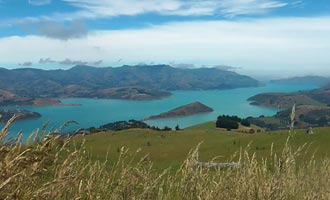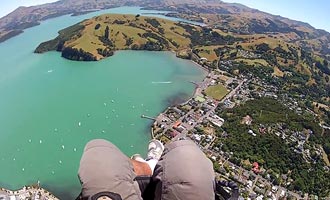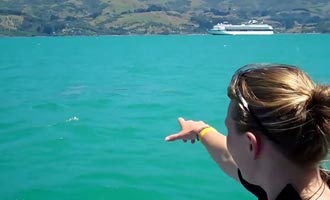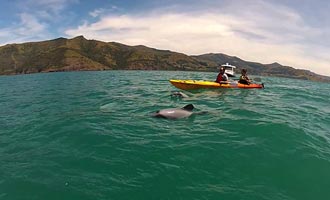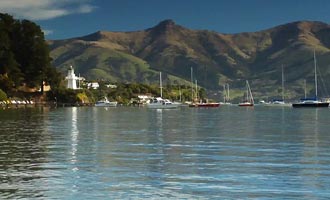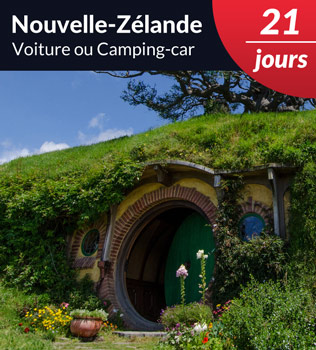
Akaroa, the Only French Village of New Zealand.
Please contact us and we will help you to organize your trip! It's free and without commitment.
- Read the post
- Details
- Advices
Schedule of the Visit.
- 1Your Last Day in New Zealand.
- 2At the Heart of Banks Peninsula.
- 3Climb to the Top of the Peninsula!
- 4The Descent to the Port of Akaora.
- 5The History of Akaroa's French Settlers.
- 6The French Streets of Akaroa.
- 7Little Bistro Café and the Home of the Giants.
- 8Swimming with Dolphins.
- 9The Finishing Touch of Your New Zealand Stay.
- 10Akaroa or Christchurch?
Your Last Day in New Zealand.

Christchurch is usually the last stop of the stay.
For most travelers, the visit of Christchurch marks the end of a journey in New Zealand. Nearly destroyed by the 2011 earthquake, the largest city in the South Island is no longer a major tourism attraction. In these circumstances, it is legitimate to seek an alternative.
Founded by French settlers in the Banks Peninsula almost two centuries ago, Akaroa is the oldest town of the Canterbury region. The only attempt of colonization of New Zealand by France has been a failure, but left marks. The Banks Peninsula and Akaroa are only one hour drive from Christchurch. Nothing therefore imposes you to mope in a café while waiting a plane at the airport.
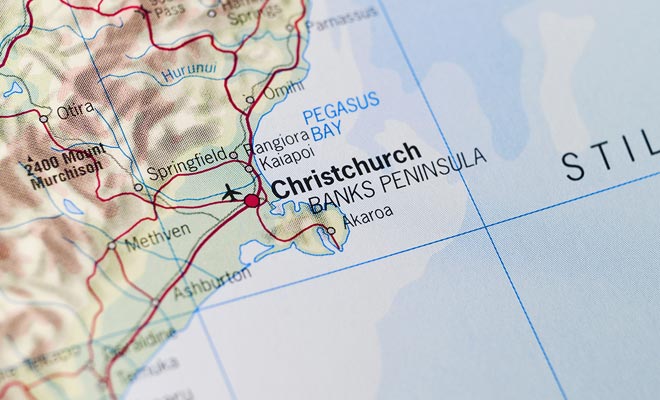
Akaroa is only 85 km (1h15) from Christchurch.
Of course, you need a minimum of time or you'll travel with an unpleasant fear to miss your plane.
You'll need at least a full morning and a part of the afternoon to enjoy your last visit in New Zealand.
As usual, you should learn the historical background of the region to fully enjoy your trip. But don't worry, I will cover the subject before our arrival at Akaroa. You can keep smiling: the holidays are not over yet and some surprises are to be expected!
At the Heart of Banks Peninsula.
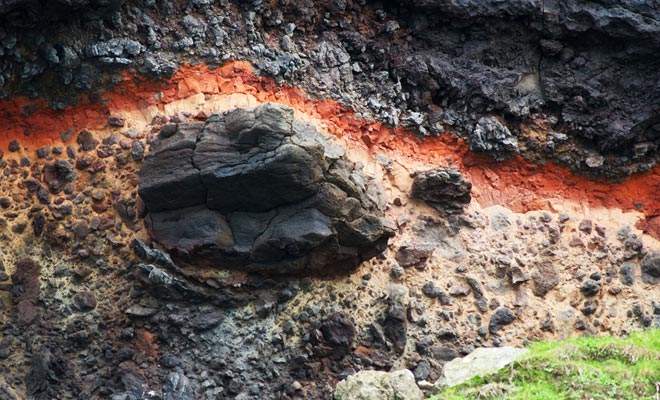
The mountains of the peninsula are of volcanic origin.
sky, Banks Peninsula draws an almost perfect circle in the middle of the east coast of the South Island. The 1,500 meters high mountains surrounding the bay are considered to be more than eleven million years old.
From the sky, it's easy to realize that the mountains are parts of two ancient volcanoes which emerged from the ocean during gigantic volcanic eruptions.
Milford Sound on the South Island share a similar origin, when massive glaciers literally grinded the rock centimeter by centimeter during centuries. At the end of the Ice Age, the ocean rushed into the crater and create what is now the Banks Peninsula.
The Maori warriors called this place "Te Pātaka" a Rākaihautu in honor of a legendary explorer. Protected from the wind by its relief, the bay where palms grow, is famous for hot summers and mild winters.

Only a microclimate allows nikau palms to grow.
Fishing but mostly the hunting were at the origin of bloody tribal wars when the Moa (a giant three meters ostrich) became extinct and subsistence was suddenly more difficult to find. This period of great tensions coincides with the arrival of Western explorers.
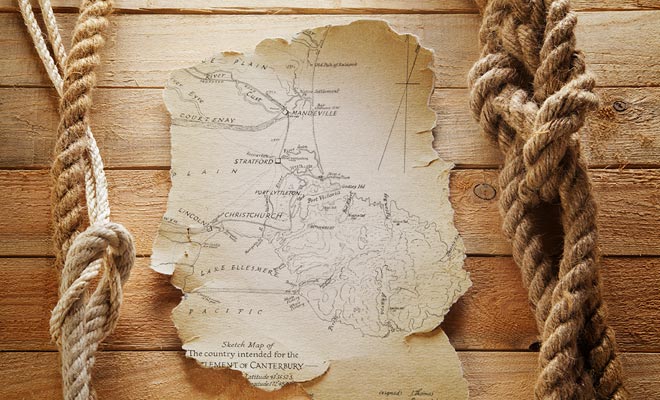
Captain Cook's map confused the peninsula with an island.
Named in honor of the botanist Joseph Banks who accompanied the expedition of James Cook in 1769, the peninsula is confused at first with an island (just like it was many centuries ago before the alluviums connect it to the South Island.
A mistake to be fixed only forty years later, but I think we have already spoken too much about the Banks Peninsula. I'll tell you some more when we'll reach Akaroa.
Climb to the Top of the Peninsula!
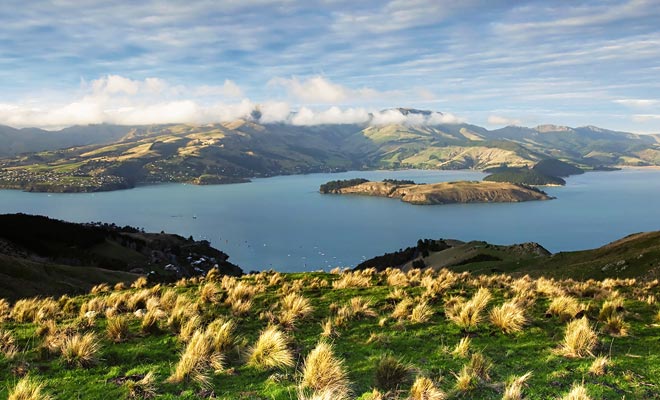
The longest route passes through the splendid Lyttelton bay.
You should plan about 1 h 15 of travel time to complete the 85 km between Christchurch and Akaroa. Please notice that most travelers are unaware that there are two different routes.
The road crossing Lyttelton Harbour via the SH74 is impractical for camper vans.
Even a light vehicle might get in trouble in the tortuous mountain path. This alas the price to pay to enjoy the best views of the bay.
If your time is running short, you should consider the shortest itinerary.But have no regrets: the SH75 alternative is also quite spectacular.
Akaroa will be your final stop and there is no risk of getting lost on the way (you'll be back soon enough not to miss the plane at the end of the afternoon).
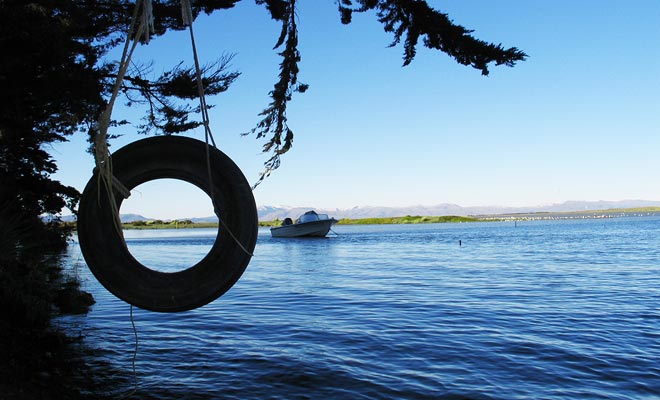
Lake Ellesmere precedes the hills of the peninsula.
Shortly after leaving Christchurch, we will go along several lakes.
It would be great to have a break to admire the black swans and the water birds of Lake Ellesmere. But we have a busy schedule, and the ascent towards Hilltop will begin soon. The summit of the crest reveals one of the most beautiful panoramas of New Zealand.
The green hills covered by sheep shine in the sun. The town of Akaroa already appears in the distance.
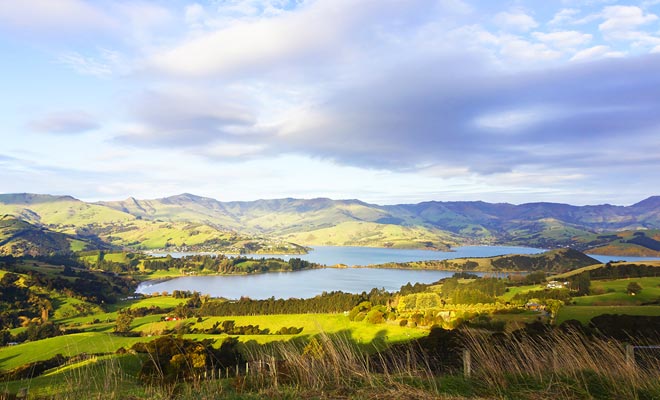
One can distinguish Akaroa from the top of Hilltop.
The late summer landscape will be colored yellow before the snow begins to fall.
But the best is still to come in early spring, when the snow covered mountaintops seem sprinkled with icing sugar.
If you find some coins in your pocket, you may use the binoculars to identify the points of interest in the bay. But it is even better to spend your money for a coffee at the Hilltop Tavern terrace.
However, don't spend to much time here because the view will still be there when we'll take the path in reverse later.
The Descent to the Port of Akaora.
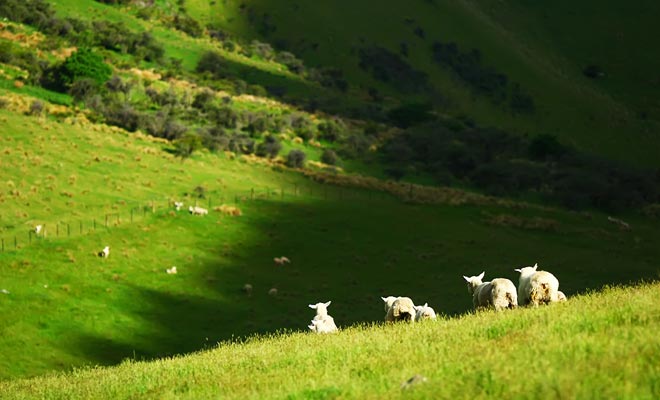
Thousands of sheep occupy the immense hills.
It would be tempting to branch off via the Akaroa Summit Road along the ridges of the peninsula. The road leads to splendid views indeed, but it can be slippery and even dangerous. As planned before, we will follow instead the main road, which is also the fastest to reach Akaroa.
Twenty minutes are all you need to reach the hills that serve as refuge for the legendary Patupaiarehes.
These evil spirits will attack the humans during moonless nights, and the sound of a flute in the mist usually betrayed their presence.
We wont have time neither to stop at the cheese factory of Barry's Bay and we will simply cross Duvauchelle.
But if you need a stop on the way, I suggest the fisherman Hotel which is an old pub rebuilt after being burned during the prohibition of 1880.
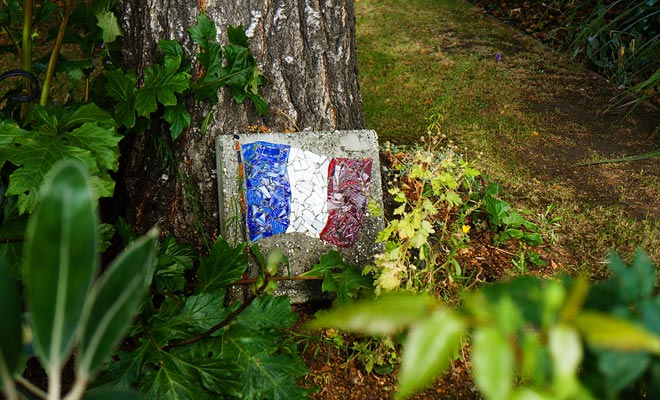
The marks of France are present in the region.
After a long stay in New Zealand, the presence of a French flag at the entrance of Akaroa gives a strange impression. Dalys Wharf, a charming photogenic jetty advances into the turquoise waters of the bay. Before exploring the village, it is time to enlighten you on the reasons which motivated French people to risk their lives on the oceans to come here.
The History of Akaroa's French Settlers.
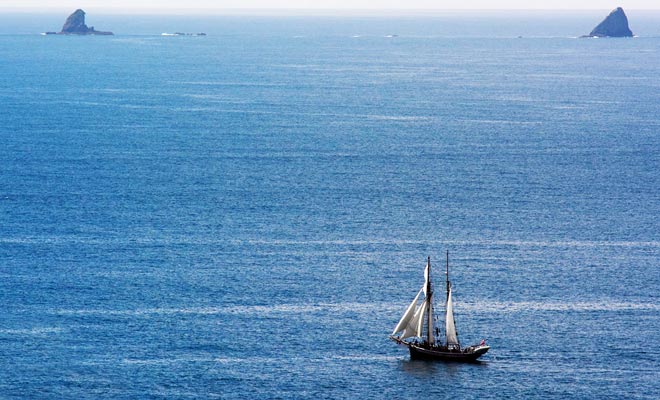
Imagine the condition of the passengers after four months at sea!
In 1836, Westerners have not yet taken control of New Zealand. The hostilities between Maori tribes started again (with the complicity of an English sailor) and the peninsula of Banks is depopulated by bloody battles.
A French adventurer named Jean Langlois took the opportunity to acquire 12,000 hectares of land in the name of France.
The deal is done with Maori for the paltry sum of 1,000 francs (one hectare of land then cost triple in Europe).
The Maori warriors reputation and some cannibalism rumors do not allow to recruit settlers without government support.
Four years will be lost before being able to convince king Louis-Philippe to accept the funding of a colonial mission.
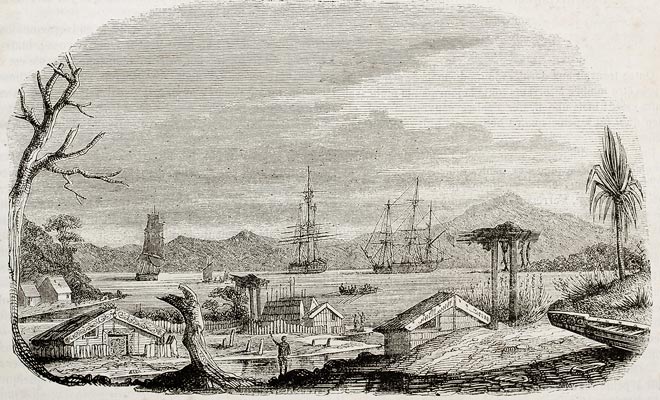
The arrival of the French settlers in Bay of Islands in 1840.
When french settlers reach New Zealand, the Treaty of Waitangi has been signed and the North Island came under British sovereignty. However, the french ambition to gain control of the South Island is still alive but time is running short! The British having realized the danger are now doing their best to slow the french progression.
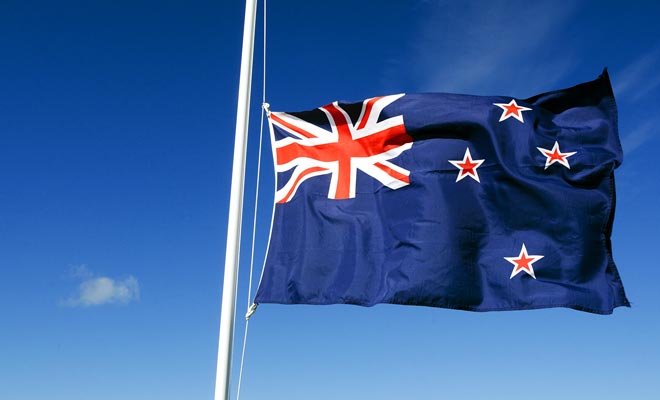
The British arrived a few days before the French.
And when the French sailors arrive in the peninsula of Banks, the British flag is already floating on Akaroa.
The France has just missed a unique opportunity to gain a foothold in the country. There will never be a second chance.
Forced to disembark, French settlers have no other choice but to sell their land to the British crown.
They will be naturalized in 1850 but time has not erased all memory of this adventure, and some people still claim to have ancestors from Nantes or Bordeaux.
The French Streets of Akaroa.
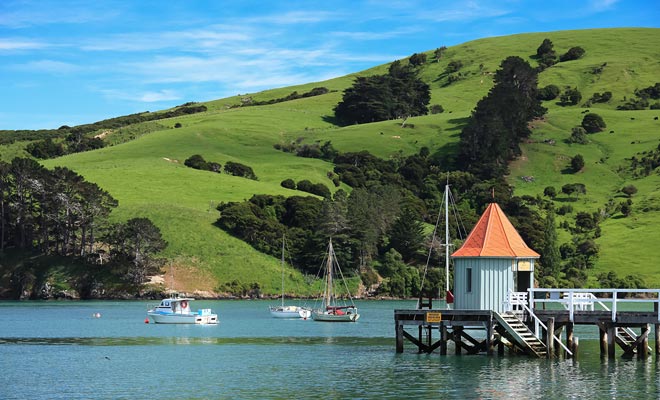
The Dalys Wharf pontoon on the sea front.
Akaroa (which name means “long bay” in Maori) is divided between the waterfront and the old town. If you pick a map at the information center (iSite) you'll realize that street names like Balgueri, Jolie or Lavaud testify French origins.
First observation, the charming bungalows with their casement shutters are well maintained since almost two centuries. The oldest Canterbury cottage, built in 1841 for Aimable Langlois (the brother of the whaler who purchased the land to Maori in the first place) even survived the terrible earthquake of 2011.
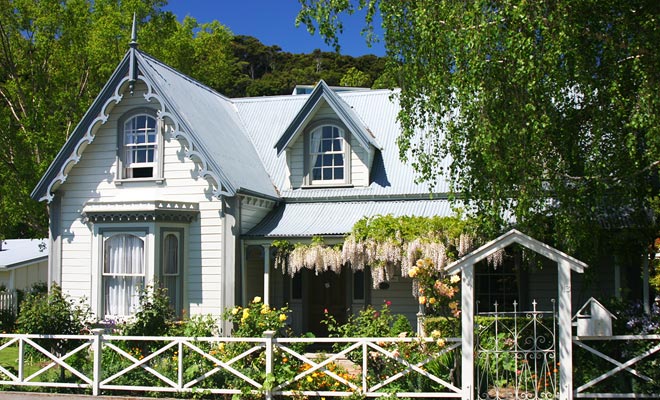
The old homes of the settlers are still inhabited.
On the beach of volcanic rocks, a descendant of the first settlers dressed in the 19th century's fashion tells the story of the city. You may spend some time in his company or contemplate the photographs of the first settlers in the Akaroa's Museum (spread over three buildings including the old court).
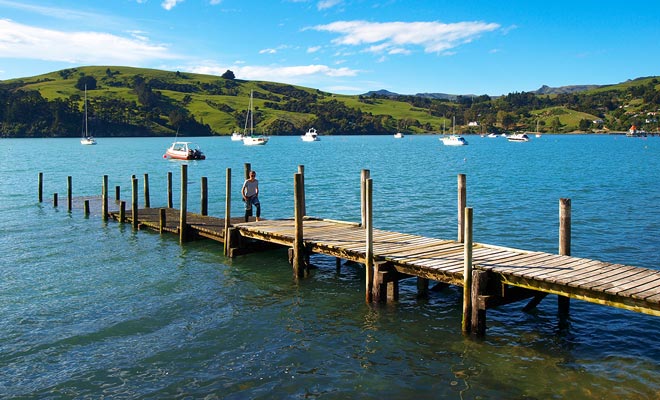
We will have to wait until the low tide to enjoy the beach.
It had a nice atmosphere, but the old French cemetery was alas replaced by a simple monument.
The memorial stone marks the visit of Michel Rocard (french prime minister) in 1990 few years after the Rainbow Warrior scandalous affair.
Decorated with French colors, the small shops of the waterfront are selling souvenirs that do not seem to come from a workshop in China. If the purpose is to buy some sweaters made of wool, you'd better spend your money here instead of the Christchurch airport's duty-free shop.
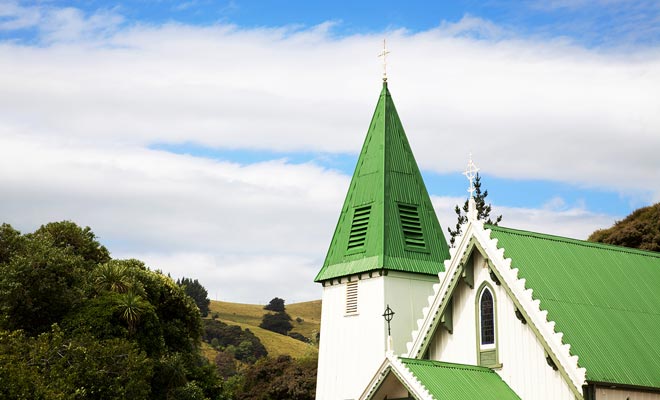
St Patrick was the first Catholic Church in New Zealand.
I suggest you follow the easy walk to St Patrick, the oldest Catholic church in the country built in 1864. Then, you can climb the slopes of the Garden of Tane and enjoy the spectacular views on the Bay. Feeling hungry by then? Well, it's lunch time!
Little Bistro Café and the Home of the Giants.

The Little Bistro Cafe is the best restaurant in Akaroa.
Akaroa has many restaurants. Among them, I recommend The Little Bistro Café for its rustic cooking but prepared exclusively with fresh products of the peninsula.
The tiny room and small tables glued to each other yet presaged the worst. Fortunately, we are not in a tourist restaurant as evidenced by the presence of villagers.
In the plate, as I said before, you can expect simple but tasty cooking (nice portions in my humble opinion).
The waitresses are smiling, and the prices are not excessive ($30 per person for a good meal).
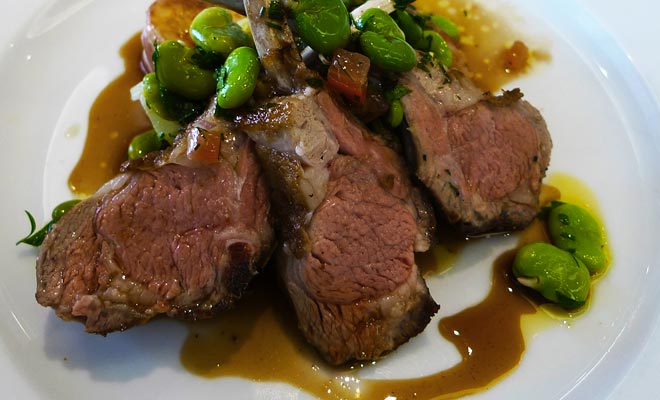
Meat lovers will enjoy!
If you hesitate between the lamb and the salmon, remember that this one has been caught in the bay the very same day while the lamb comes from a farm close from here in Pigeon Bay. Desserts won't disappoint you as well, and there are chances for it to be the best meal of your stay ...
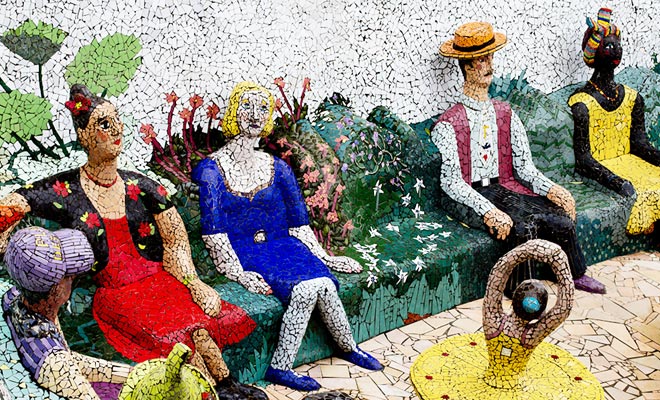
Difficult not to smile when visiting the Giant's House.
After lunch, we still have an hour to kill before a great activity scheduled for early afternoon.
I suggest spending some time in Josie Martin's garden: The Giant's House is both a bed and breakfast and an eccentric museum with originals mosaic sculptures.
You may argue that the entrance could be less expensive ($20 still ...)but I never heard anyone complaining about the visit.
Enjoy your time, but remember that we have a boat to catch!
Swimming with Dolphins.
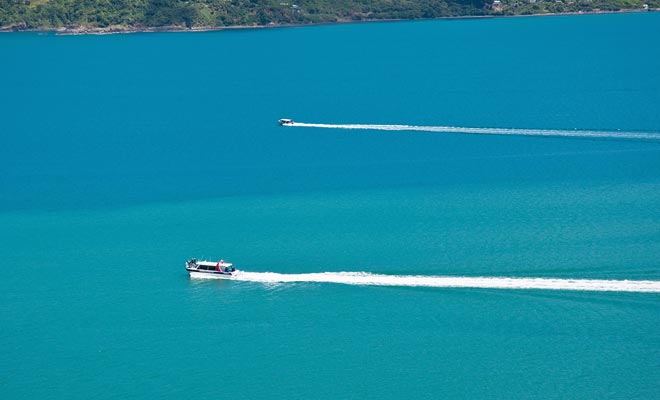
Several companies organize outings at sea.
The “Black Cat's” is the ship that should lead us to the dolphins that inhabit the bay. The chance to observe these marine mammals are 98% and the organizer repay much of the ticket in case of bad luck.
The Hector's dolphin is the smallest of its kind, but it remains fascinating. At a cost of $145 per person, it is even possible to swim with dolphins. However, you'll need to put a combination (water is fresh in the bay) and wait for the opportune moment.
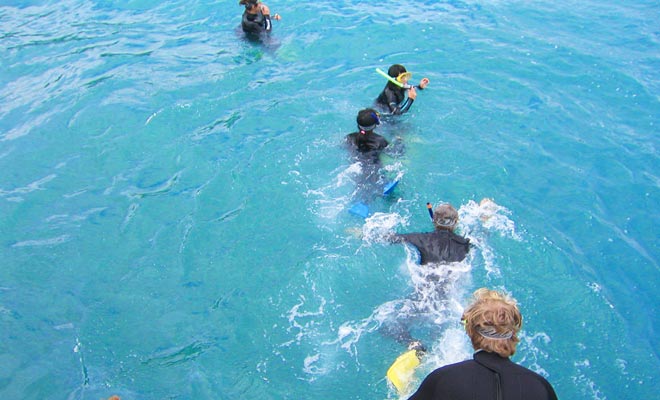
You must wear a combination to swim with the dolphins.
It is of course possible to admire the dolphins without going to swim among them.
During the return trip, we will also explore the bay to spot sea lions and penguins. Throughout the trip, the audio commentary on the formation of the peninsula and the small dog on board named captain Hector (he even has his very own life jacket) will amuse you.
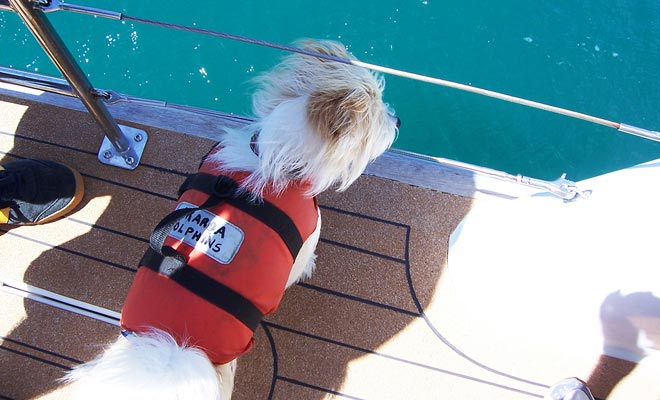
Captain Hector (Murphy) will spot the dolphins.
Usually it is necessary to use a sophisticated sonar to spot dolphins.
The crew, however, chose to rely on the flair of Captain Hector. And it's not a joke! Trained to recognize the sounds imperceptibles to the human ear, the small dog barks to show the right course and you'll soon reach the dolphins.

Hector dolphins are the smallest dolphins in the world.
If oilskins are provided and it is possible to hide inside in case of bad weather, but you can stay on the deck most of the time. The sun gives to the bay a turquoise color, and with dolphins leaping from both sides of the ship, I think it will be very difficult for you to leave even if you have a plane to catch in the evening.
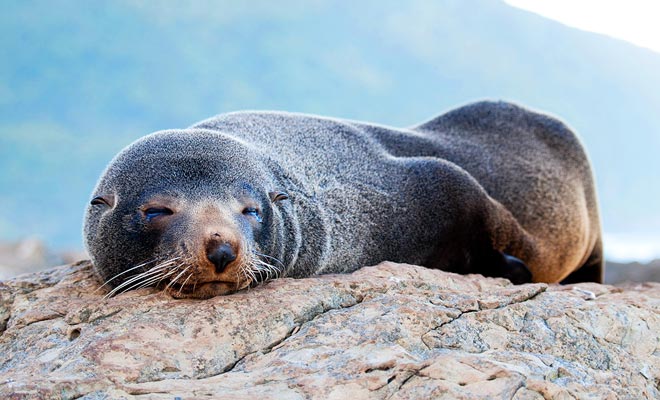
Fur seals rest quietly in the sun.
Having reached “Goat Point”, the captain stops the machines in order not to scare white-flippered penguins (an endemic species of New Zealand).
The boat rocks gently while the crew offers glasses of wine (and some delicious cookies) to the passengers.
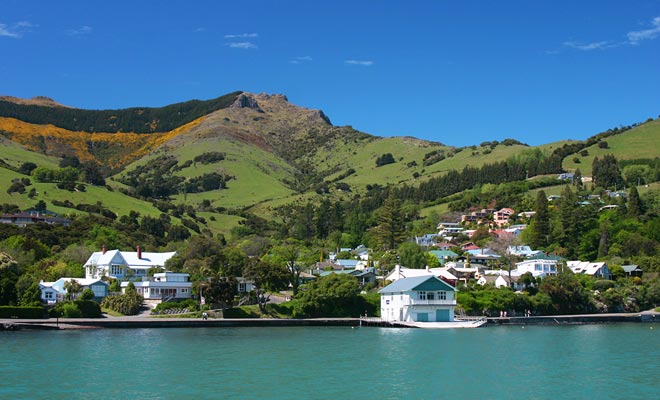
The village of Akaroa seen from the sea.
This is a fine example of family business (greetings to Craig and Patsy) where the customer is not considered as a cash machine.
The sea trip is deliberately limited to about thirty participants, which is great if just like me, your are not a big fan of crowded touristic activities.
Back at the dock, you might fear it's already time to leave Akaroa, but we still have time for one last surprise, so do not hang around!
The Finishing Touch of Your New Zealand Stay.
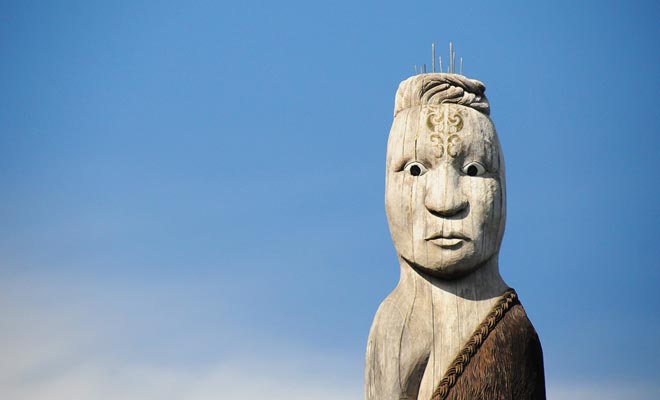
The hills of the peninsula are full of surprises.
Our last stop is only a few kilometers drive from Akaroa. That's enough time for me to present you the most outstanding hikes in the region. You may schedule some of these treks during a next stay!
Most of the trails starting from Akaroa lead to beautiful views of the bay. Expect to climb, but you wont regret it when you'll reach the top. The volcanic hills relief is varied, and forest intervals are very nice (especially in summer when temperatures rise).
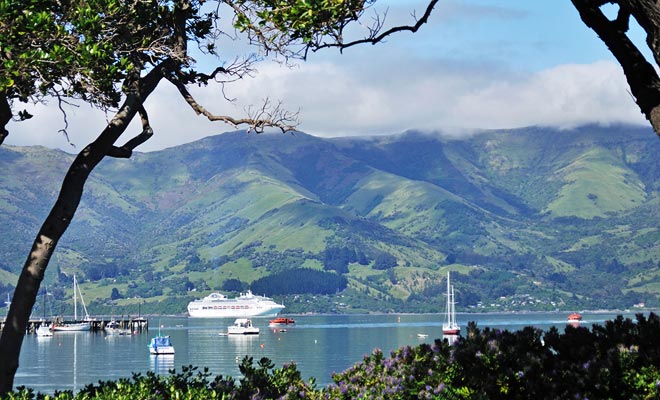
The views of the peninsula are spectacular.
The most courageous of you should join the famous “Banks Peninsula Track”. This is a private path (and this is why you'll have a fee to pay) that bypasses the bay during 35 kilometers. Depending on your stamina, you'll need between two and four days to complete the entire trek and you'll spend your nights in huts.
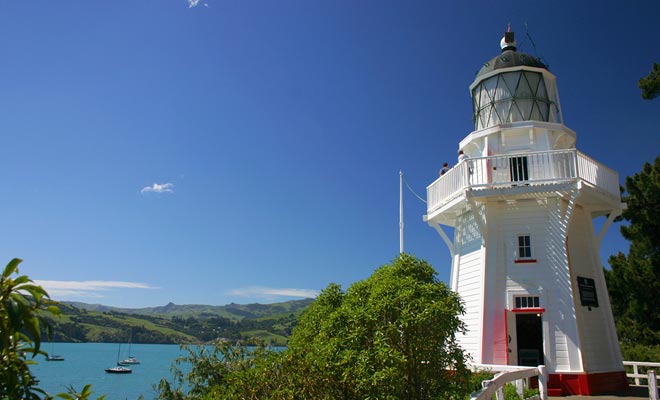
The lighthouse was moved from Stony Bay to the cemetery.
Definitely more affordable for a passing visitor, “Round the Mountain Walk” is a four hours looping track. In my opinion, this walk is just the best compromise, with its spectacular views spread over ten kilometers.
If you're running out of time, or just too tired at end of your stay, you can just follow the “Akaroa Historic Walk” during 2 hours. The trail passes through forty historical sites, and ends at Akaroa's lighthouse.
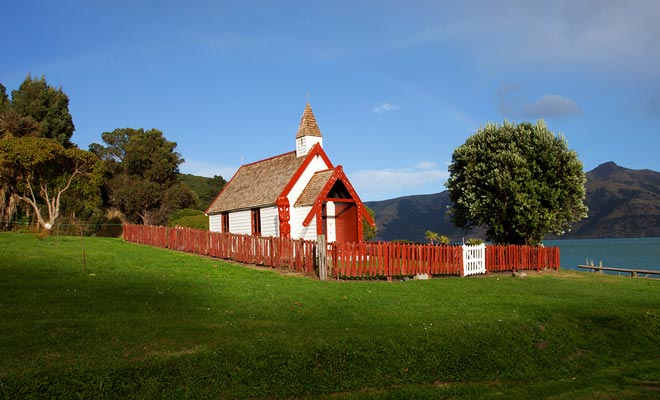
The Onuku Catholic Church decorated with Maori patterns.
That's enough about hiking, we have reached our destination. Onuku is only 5 km from Akaroa and its Maori's name means “a short stay”.
Well, that's why we are here indeed!
The 1876 Catholic Church is decorated with Maori symbols.You could have bought a jade stone or a souvenir in tourist shops, but I have always felt that this last visit is the right conclusion of a first New Zealand trip.
Akaroa or Christchurch?
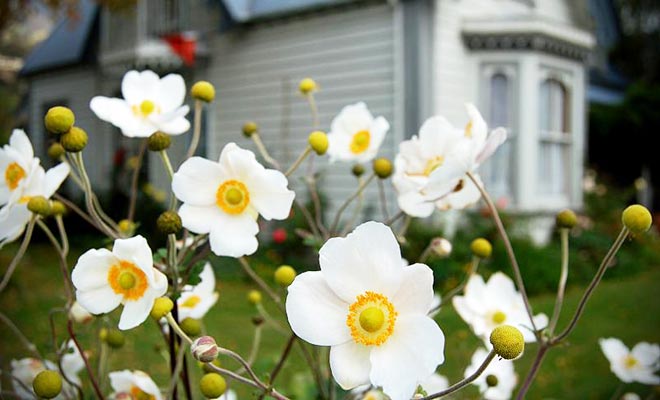
Akaroa is a haven of peace.
It will take at least a decade for Christchurch to recover from its wounds. Another good reason not to miss Akaroa which is so close... Ideally, you should consider two days to explore the peninsula.
If you still have a vehicle but a flight scheduled at the end of the afternoon, do not give up, you have enough time! Reaching Hilltop and its incredible view is possible if you have at least one hour to do the round trip.
However, if you have already returned your vehicle, you can still opt for a bus ride. The shuttles are quite limited and you'll need to leave Akaroa, whatever happens, in the middle of afternoon.
On location, you'll have to choose between a city tour or a boat trip to see the dolphins.
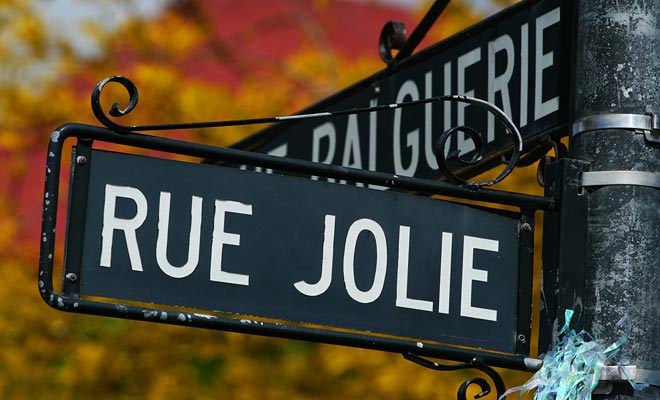
Some streets have kept their original French name.
If you visit Akaroa in winter or in summer, you'll either be all alone or surrounded by a crowd because many New Zealanders own a vacation home in the area. Few hundred locals live here all the year, but the population suddenly rises to 6,500 souls between December and February.
The French Fest and its snail race is quite popular among the vacationers of October.
But this “tradition” is not as old as the foundation of the city, and the lucky winner of the race is not the only snail spared as alleged.
This is why some people ask themselves if Akaroa is not using the folklore to lure tourists. For it must be noticed that some streets have regained their original French names magically in the 80s...

The seagull can make fun of it, France missed its chance.
But these are actually insignificant details: the old houses are authentic, just like the history of the foundation of the city by the french settlers. The “Francophone” decorations are always elegant and not omnipresent. The village is lovely and the locals are friendly!
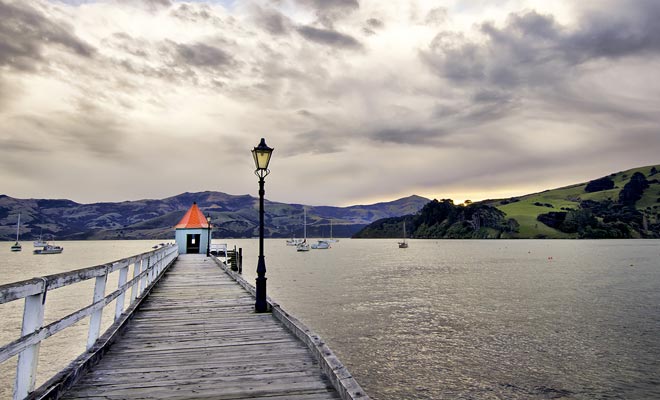
Akaroa is one of the country's must-see destinations.
In terms of activities, Akaora is flawless! It is also better to suggest Akaroa instead of the Bay of Islands or Kaikoura peninsula to swim with dolphins. And assuming this visit to be the last of your stay in New Zealand, you can't find a better way to finish off.
There is therefore no need to debate the question for hours: you should always prefer Akaroa to Christchurch unless weather is bad or if yourschedule is tight.
You may need some help to organize your visit of the peninsula? Our friend Ben the Kiwi is here to answer all your questions. In return, remember that we would be happy to receive some photos of your stay in Akaroa.


Questions & Answers.

What can I do for you? Because the city is close to Christchurch, I often spent holidays in Banks Peninsula. Difficult not to be moved by the beauty of these landscapes. I'll answer with pleasure to your questions about Akaroa.
- All topics ... 28 answers in total
- Transports 5 answers
- Practical Information 4 answers
- History and Legends 4 answers
- Restaurants 3 answers
- Seasons and Activities 3 answers
- Museums 3 answers
- Accommodation and Camping 3 answers
- Sea Excursions and Dolphins 3 answers
Transports
- Can we visit Akaroa if we have a plane in the evening?
Absolutely, provided you make sure to return to Christchurch in the late afternoon to maintain a margin of safety.
- Can we settle for the ride to Hilltop?
If you are in a hurry for time, that is a feasible solution. It takes an hour to get there, not to mention the time spent admiring the view over the Banks Peninsula.
- How long does it take to get to Akaroa?
It is a one hour and a quarter drive from Christchurch (depending on your departure point). This travel time is valid if you drive on the SH75 which offers the fastest route.
- Can we borrow Summit Rd with a Camper?
It is possible, but not advisable in bad weather. On the other hand, no special worries in minivan if you stay focused on the road.
- How to reach Akaroa by bus?
Departures from the bus shuttles take place in front of the i-Site in Christchurch. A stop is scheduled at Hill top for you to enjoy the panorama and take some pictures. Departure every day at 8:30 am from May to October for $35 per adult and $30 per child. The return shuttle leaves Akaora at 3:35 pm. From November to April, the fee increases to $50 per adult and $40 per child, and departures are more frequent (8:30 am and 1:30 pm) and returns at 10:30 am And 15 h 45. The journey of 80 km is covered in 2 hours, which is significantly longer than car (1h15).Akaroa Shuttle
Practical Information
- Where to find the iSite?
The iSite is located at the corner of Lavaud and Balguerie streets. It is open from 8:30 am to 5:30 pm and also serves as a post office.
- How to get more information about Akaroa?
Visit the official website of the city.Akaroa official website
- Is there a bank in town?
There is only one bank in town, located in a splendid house in front of i-Site. It is a BNZ (Bank of New Zealand) agency that has an ATM. Open on Mondays, Wednesdays, Thursdays and Fridays from 9 am to 4:30 pm and Tuesdays from 9:30 am to 4:30 pm.Akaroa BNZ
- Is there a supermarket for shopping?
The Four Square on Lavaud Street is open from 9 am to 6 pm (closed at 4 pm on Sunday).
History and Legends
- Did the English have stolen Akaroa from the French?
Technically speaking yes. In fact, they let the French settlers alive and then they bought the Nantes-Bordeaux company. The scenario could have been much worse. That said, the French had bought the land from the Maori at a scandalously low price and they had not even paid the balance.
- Why did the French not confront the English?
Because they did not know the presence of the British forces in New Zealand. They only discovered the occupation of the country by arriving there. The French crew was not made up of soldiers, but colonists chosen primarily for their technical skills (peasant, carpenter, doctor ...).
- Why did the French accepted to become English?
They did not have a choice. The English favored the repopulation of the peninsula with anglophones. The French found themselves in a minority.
- What is the legend of the Patupaiarehe?
These pale-skinned spirits live in the forests and mountains of New Zealand (according to the Maori tradition). Still according to the same sources, these legendary creatures would be hostile to humans and the sound of a flute would betray their presence. Note also that the Patupaiarehe is called Pakehakeha (paheka being the name given to foreign colonists, which betrays the bad relations of the time between Maoris and British).
Restaurants
- Do you recommend Hilltop tavern?
Some will say that the main interest is to lunch on the terrace to enjoy the view. This is not fake, but the map and quality of service are correct. In other words, it is a great stopover, especially if you do not intend to continue up to Akaroa.Hilltop Tavern
- Should we book a table at the Little Bistro?
I agree with Guillaume, it's the best restaurant in town (even if you're a little tight inside). The reservation is imperative all the year, as there are few seats and a high demand.The little bistro
- Should we visit French Farm Winery?
Once a botanist plantation, it is now a quality restaurant located outside Akaroa. To consider only if you spend at least one night in the peninsula.French Farm Winery
Seasons and Activities
- What is the best time to visit Akaroa?
As often in New Zealand, it is difficult to answer this question. The summer is nice and allows you to swim with dolphins in a not too cold water (you will have to wear a combination anyway). In winter, the panorama is perhaps even more beautiful when the top of the hills is snow-caked. In my opinion, only the fog should deter you from visiting the city.
- When is the French Fest festival?
This festival takes place every year during the month of October. Visit the official website to know the dates of these two days of entertainment and concerts. The attraction is mainly due to the quality of its market.French Fest
- When can you swim in Akaora?
You will need to wear a combination all year round, as even in summer the water temperature does not exceed 17 degrees. If you want to go swimming with the dolphins, I still recommend doing it during the summer. If you are afraid of getting cold, you can just admire the dolphins from the ship, it will be extraordinary too.
Museums
- Should we visit the Akaroa Museum?
If you read Kiwipal's article about Akaroa, it's probably a superfluous visit.
- How to visit the museum of Akaroa?
Access to the museum costs $5 per adult and $1 per child. This is reasonable, especially since the rooms are very small. Access is from 10:30 to 16:30 (16 h in winter).Akaroa Museum
- Should we visit the Giants House?
The entry fee of $20 may seem excessive, but the quality of the garden will soon make you forget this expense. The works exhibited are very original and recall a little the park Güell Barcelona.The Giants House
Accommodation and Camping
- How to stay in Akaroa?
There are many B & Bs and motels in the peninsula, so you are spoiled for choice if you book through the internet. The best are:La Rochelle MotelLa Maison de la MerCoombe Farm Bed and Breakfast
- Is there a campsite on site?
The Akaroa Holiday Park is a large 3.5-hectare campsite with stunning views of the bay. You can plant your tent for $30 or park your camper for $35. The bungalows are good, but more expensive (from $70 to $120). The camp site is located at 96 Morgans Road in Akaroa.Akaroa Holiday Park
- Are there backpackers in town?
There are three backpackers in town, with rates ranging from $25 to $70.Chez la Mer BackpackersAkaroa Dolphin BackpackersBon Accord Backpackers
Sea Excursions and Dolphins
- How to register for an outing at sea?
The 2 hour exit leaves the port of Akaroa every day at 11 am and 1 pm. Additional departures are added in summer, check the official website for your reservations. Expect to pay $65 per adult and $14 per child. Stopovers take places in Lucas Bay where is the breeding of salmon and at the restaurant Little Bistro.Akaroa Harbour Nature Cruises
- How to go swimming with dolphins?
It is recommended to book your seats on board, especially in summer. There are 16 outings per day during the high season and you will have to spend $145 per adult and $120 per child for the pleasure of swimming with Hector's dolphins. On the assumption that these adorable mammals would not show up, you can either be reimbursed up to $80 or come back another day.
- How to register for Banks Peninsula Track?
This well marked out private trail is undoubtedly the most panoramic of the peninsula. You can travel the 35 km of the course in two or four days. The rate includes nights spent in a shelter (approximately $160 for two days and $250 for four days).Banks Track

